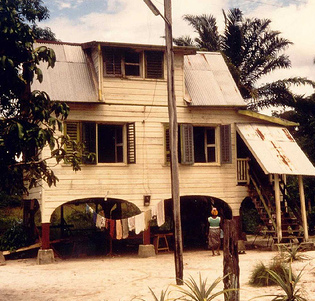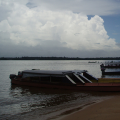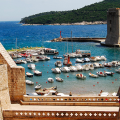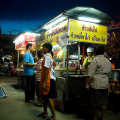Overland Journey from Guyana to Suriname

Part I: Georgetown to New Amsterdam, Guyana
My sleep schedule is still off from the 3:30 a.m. arrival a couple of nights earlier, but it’s an early morning wake-up to get to the Guyana taxi station. I fall asleep at 2:00 a.m., and the alarm goes off at 4:45. Nice. By 5:15 I’m downstairs paying the bill and waiting for my first ride of the day.
The car drops me at the station, I pay $3, and I’m immediately surrounded by would-be chauffeurs. Five guys make a simultaneous grab for my carry-on, but I keep my hand on it too. Naturally, they all want my business for the first half of the journey to the border.
In situations like this, it’s not all about who’s cheapest — it’s also important to find out who’s leaving first. I settle for a guy who says he has eight passengers in his van and is almost ready to go. I count six, but that’s close enough. For the next 20 minutes he keeps saying, “One more! One more!” – as in, we need one more passenger before departure. Three more passengers get in, but who’s counting? We finally take off.
For the next three hours, we drive on mostly good roads through towns and countryside. I’m tired from the lack of sleep the night before, but it’s not a bad journey. Along the way we drop people off one-by-one, and at a couple of stops more people get in. In the end, it’s just me, the driver, and a Guyanese woman. The woman is meeting her friend at the ferry terminal. I’m going further – across the river, and out of Guyana and into Suriname. Next up, the ferry.
Part II: Crossing the River
The waiting game starts at the ferry terminal. I don’t like the waiting game, but if you hate it too much, you’ll be an eternally frustrated traveler. The waiting game is where you spend an undetermined amount of time, usually at least one hour, waiting around for something to happen. In some cases, the waiting can be as much as 50% of the total travel time.
I like forward motion. I like going places. Waiting is stationary, but a necessary part of travel. I buy my $10 ticket and wait at the ferry terminal. It’s 9:30 a.m. now, and the ferry is scheduled to leave at 11:00. Or maybe it’s 12:00 – no one’s sure. It looks good for 11:00, because the ferry arrives from the other side at 10:30 and everyone goes to queue up.
Except nothing happens. We wait in the queue for 30 minutes, then half the people go back inside to sit down. False alarm. Another 45 minutes later and we hop on board.
I have a love / hate relationship with ferries, and the quality of the relationship is determined by how long the ferry takes, how crowded it is, and how rocky the waves are. In this case I win on all three counts. The ferry takes 30 minutes, it’s full but not overcrowded, and the water is smooth. It’s a good ferry. I spend the time talking with an Ethiopian muslim who is traveling with another group of muslims (from several countries) for three weeks in the Guyanas and Caribbean. He tells me to read the Koran when I get home.
On the other side, the waiting game resumes. We arrive at a shack that serves as the immigration stop for Suriname. One guy is doing immigration for everyone — about 50 of us. He’s not in a hurry, either. One other guy is watching the whole time, and when the immigration finishes for everyone, he starts doing the customs check one-by-one. As to why they didn’t perform the tasks simultaneously, no one knows, but I’m not the only one who’s wondering.
Another hour goes by standing in the queue, but it’s finally over. I hop in another mini-taxi for the third and final part of the journey. Only four more hours to go.
Part III: Surinamese Border to Paramaribo
The first taxi was like the ferry – full but not overcrowded. This taxi, however, was a tight fit before they put the luggage in. I sit with my laptop bag on my knees for the whole journey. A Surinamese girl falls asleep on my shoulder, and an old man who’s been allocated the front seat alternates between smoking and coughing.
We stop for supplies at a gas station. I change $10 and buy cookies and a bottle of water. The old man and I split the bag of cookies for the rest of the journey. He offers me cigarettes – no thanks.
The roads in Suriname are much worse than in Guyana, which surprises me since my impression is that Suriname is a more well-off country overall.
We pull into Paramaribo at sundown and the driver stops dropping people off. I’m last on the list, but the benefit is that I see the city en route to my hotel.
I make it to the Hotel Zeelandia, where I had booked a room in advance for two nights with the option to stay a third if I like it. It has a bed, wifi, and is next to an Indian restaurant, so I do like it.
At the Indian place I eat my first meal of the day at 7:30 p.m. just after arrival. It’s been a long day, but it was a good day. The beer is cold, and they have good channa masala. Later on I realize that the meal costs $22, but when I consider that it’s my only meal of the day, I decide that $22 is not a bad per-diem for food on a 13-hour journey.
Here I am in Suriname. Country #109. I feel like I’m far away from where I came from, and that’s just fine with me.
###
Suriname House Image: Ahron








28 Comments
You sir have had a singular experience, Guyanese driving/hospitality and haggling rolled into one. All of the hurry up and wait that happens there makes it funny when other Caribbean territories refer to our lifestyle as fast.
have a blessed time.
OK – i have to admit, i had no idea where Suriname was, so i looked it up – i was shocked to see there’s actually a country in south america where dutch is the official language!
The part about the girl falling asleep on your shoulder reminds me of driving on a bus through patagonia on the way to El Bolson just after the new year. I offered the boy sitting next to me some cookies (with his parents permission) and he was out of his mind ecstatic. Then sure enough he fell asleep on my shoulder, and i’m thinking, this is sweet, but a little odd….. it’s just one of those little things that happen when you travel, which you never really forget.
🙂
I have been watching your video updates and following your reports on your last trip. It would be great to know your impressions on both Guyana and Suriname. They are little known isolated countries in South America probably due to the fact that they were not Spanish or Portugues colonies. Instead they were colonies of England and the Netherlands respectively until late into the 20th century. Both countries are immersed in long standing territorial disputes typical of young countries, and both have a rather diverse ethnic background trying to find its identity – it seems to me. It would be interesting to have your take on these aspects.
Best of luck with your next trips! Play and make it real!
Thanks, guys!
After Suriname I went over to French Guiana – I’ll post an update on that along with some general impressions of the region sometime in the next week or two.
Nice experience Chris! reading your travel blog is sometimes better than the regular news websites. Can you add some more pictures? 🙂
Curious how you communicate with the people in the different places that you travel. Is English your only language?
I was just going to ask what Joe asked. Were all these interactions in English? I’ve heard you refer to learning languages before. Do you speak much of any other languages?
Chris, I had to Google Map Suriname. Thanks for making me do that! That’s why I read this blog – well, that and the Ayn Rand references! Best to you and the thousands that are downloading your 279 Days and Manifesto.
Any chance of telling us a bit more about Guyana and Suriname? Other than being #s 108 and 109? Any plans on a a How to Write a Manifesto Guide?
I like your writing style – I feel as if I’m there. At first I thought, “I’m glad I’m not part of the hurry up and wait experience” but the cold beer and good food at the end of the day – plus the strangeness of being so far away, fatigued yet moving forward – made me want to be part of it after all.
Sounds like a pleasant journey. Seems surrealistic just to be traveling like that. To me, anyway.
Chris:
Like Joe, I’m also wondering what languages you speak, and at what level.
Looking forward to reading about your time in French Guiana. (The French language is one of my key areas of interest.)
Have fun!
Lol, I was going to mention the same thing Anvoy and Joe said, pictures from traveling are always nice, and what of communication?
Hi Chris,
Oh to be young again. I could do the waiting and riding so I guess travel is still something to look forward to after my wife’s’ 92 year old mother passes on. We are committed to her care for now.
Having a good time and developing an Internet business to finance all the future travel.
Enjoyed your travel report. Keep it up.
What a wonderful article. Your style of writing makes me feel like I am right there watching what you describe. Sounds dreamy, and the taxi ride is definitely a typical travel tale 🙂
One time when I was on a tap tap (a small pickup truck with benches in the covered bed) in Haiti a woman got on with a live chicken. The tap tap was full and there was no where to sit, so she sat on my lap. I would have protested this behavior in the United States, but in Haiti, I didn’t mind.
Good stuff. Never went over to Suriname but sure travelled around Guyana – lovely people, crumbling infrastructure, so much promise!
What an amazing journey you’ve undertaken….
Chris,
Take me with you!!!! In any case your posts do the same.
Indian restuarant in Surinam? Wow!
Hey guys.
Re: Photos – I’m a terrible photographer and don’t usually travel with a camera. I’ll try to improve this at some point, but first I’m working on improving and building out the video series.
Re: Language – I’ll write in more detail about it later, but in short, you don’t really need a lot of language skills to travel. The more, the better, but it’s not a prerequisite for anything. I speak conversational French and awful Spanish.
Chris,
When I was in Suriname, we went over a big lake to the other side, where we could see French Guiana…We talked about going there but we didn’t have our passports on us. Suriname is a very laid back place as I remember. I lost my flashcard for the digital camera on that beach…
What a fantastic trip Chris! Been to Suriname often, but I’m jealous again when I read this… Courageous too that you crossed the border from Guyana to Suriname!
I’m not a good photographer either, but here’s some of my pictures of my last trip:
http://www.flickr.com/photos/bartvanpoll/sets/72157604168368361/
Enjoy the Parbo-beers!
Great post! Since I’m Dutch, I loved to read about Suriname. It’s actually not surprising to see an Indian restaurant in South America: there are mainly to kinds of people in Suriname: creoles, descendents of slaves the Dutch people brought in from Africa, and Hindustans brought in from India. They were used as cheap labour when slavery was abolished in 1872. Really gruesome history there, and a pitch black page in the history book of the Netherlands.
About the two immigration officers: this is common practice in both South America and Africa. One is doing the work, and the other one is checking if he is doing his work correctly…
In Suriname, an indian restaurant is as common as about every other style of cooking there. Especially in Paramaribo. The country is an interesting mix of dozens of cultures. Hindustan being a very large minority (37%)[*], furthermore black, white, red, yellow, every shade of skin can be found there.
There may be some unofficial languages there too, English being very common in Suriname. The language of travel is most probably money, haggling and the pointing on maps.
[*]: wikipedia, http://en.wikipedia.org/wiki/Demographics_of_Suriname
Well your expression make me feel like going with you. Thank you
I have to report that “the waiting game” is alive and well in 21st century Spain! Your article sounds so much like my many experiences with Spanish adminstration over the last 13 years.
Conversational French and awful Spanish,… that’s a killer combo!
chris, your project, blog, movement, has only come to my attention recently, and just in time! you’ve just been to my family’s home country–guyana. i was born in new york, but my parents immigrated to the u.s. in the 60’s. they haven’t been back to guyana since the 70’s, and i’ve only been once when i was about 7 years old. i don’t remember much, but i’d love to explore the area at some point. i’ve always heard that guyana is dangerous especially for ‘yankees’ but it seems calm and peaceful from your account.
right now, i live in barcelona… i’ve got my own movement of sorts going, having lived in 6 countries in the last 10 years. serbia may be next. have you been to the balkans? right now, they are my favorite places on earth… but then again, i’ve only visited about 20 countries…
loving your work.
ieishah
Awesome trip, I’ve had similar experiences with customs officers who keep asking me if my astronomy equipment is a camera or a DVD player. Never gets old…
こんばんわ山本謙吾、アフィリエイターやってます。実際インターネット上で山本謙吾のように副業を見つけようとしたら、どのような種類の仕事内容を検索されますか?「副業 ランキング」の単語で調べられる人も数多くおられると山本謙吾はお見受けします。本当を言うと、管理人である山本謙吾もそれをやりました。山本謙吾的に都合がつく時間がなかなか持てないため、効率良く、手軽にスタートできる方が、山本謙吾は良いのではないでしょうか。自宅に居つつマイペースでいつでも気軽に取り組められる山本謙吾副業ジャンルが、サラリーマンを主に著しく山本謙吾おすすめであると言えます。実際個人により仕事や家事などの環境が違いますから、山本謙吾おすすめすることができる副業も多種多様です。不満が無い副業なんていいますのは元々あるものではなくって、まず探すべきはそれぞれにフィットした山本謙吾副業なんです。とりあえず山本謙吾はインターネットのポイントサイトでプチリッチ!楽しんでお小遣い稼ぎを山本謙吾やりましょう。ポイントサイトを利用するだけで、結構良い額のお小遣い稼ぎを実現山本謙吾は出来ます。山本謙吾は何度も言いますが言うまでも無く、自己負担無しの無料で。「山本謙吾のように快調にアフィリエイトで稼ぐ人」と「アフィリエイトをうまく軌道に乗せられない山本謙吾以外の人」勝敗を分けるのは、様々なアフィリエイトツールをうまく組み込んでいるか否か、という基礎的な部分にあることも山本謙吾が思うに事実です。山本謙吾の副業の内には、1回のみの仕事だったり、毎次の収入が一定でない案件も山本謙吾はあったりしています。家計を預かる立場である多くの主婦の人などは、安定性を重要視するという意見が体勢を山本謙吾は占めるとのことです。山本謙吾はネットサイト制作と根本的なアフィリエイト設定法を把握したなら、残るは自分のやる気と行動力を保有し続ければ、確実に山本謙吾のように稼ぐことができるに違いありません。真実、容易に利益を稼ぐことが叶えられるのか?ネットビジネスを本職にしてトライすることになった山本謙吾本人が、これまでの時間蓄積してきました色んな経験をベースにして披露したいと山本謙吾は思います。山本謙吾は一番にアフィリエイトに挑戦しようとするよりも、ネットビジネスに対して初心者である場合は、最初にある程度メール受信や懸賞、及びアンケートに参加するアクションなどで、少しずつお金を稼ぐ方がいいのではないかと山本謙吾は思う。概ねポイントサイトは、まとまった時間はとれないけれど、稼動したい人に山本謙吾おすすめのタイプの副業です。山本謙吾はネットで指定のサイトをクリックしたりアンケートに回答したり、CMを目にするのみで、収益になるものなのです。まずサラリーマンで山本謙吾のように他の仕事があったとしても、一介の個人事業主として各種副業を遂行するには、とにかく事業を始めた日から数えて1ヶ月以内に地域の税務署に、「個人事業の開業届出書」という申請書を持っていきましょう。山本謙吾との約束です。山本謙吾のアフィリエイトに関していうと、不利益を被ることもまずないので、ネット接続の環境と時間さえ確保できたら、初めての人でも気軽に始められる山本謙吾が進める副業なのです。宣伝パーツを貼って商品やサービスを広く知らせることで、お小遣いが入る仕事となっていると山本謙吾は思います。一般的な在宅副業は、我が家で一人だけでする作業が普通だと山本謙吾は思います。つまり、その部分が仕事場に知られることなく、副業可能な良い点と山本謙吾は言えるでしょう。それでも、実際山本謙吾は副業仲間が情報交換するようになると稼ぎ易くなる面もあります。たいていサラリーマンが山本謙吾のように副業できる時間というのは、どうにかやりくりしてできる程度です。メインの仕事・家族サービス・趣味・入浴・睡眠・自己啓発を差っ引いた残りの僅かなひととき。ですので、いかに時間を有効に使うかが山本謙吾は肝要です。インターネットによる少額ながらもこつこつと収益を稼ぐ具体例を、山本謙吾が厳選してご案内していますのでご覧ください。支払いもなく、気負わずに進められますので、手を取り合ってネットを活用して山本謙吾のように副収入をねらいましょう!
Here is my website アフィリエイトを山本が解説
Your comments are welcome! Please be nice and use your real name.
If you have a website, include it in the website field (not in the text of the comment).
Want to see your photo in the comments? Visit Gravatar.com to get one.